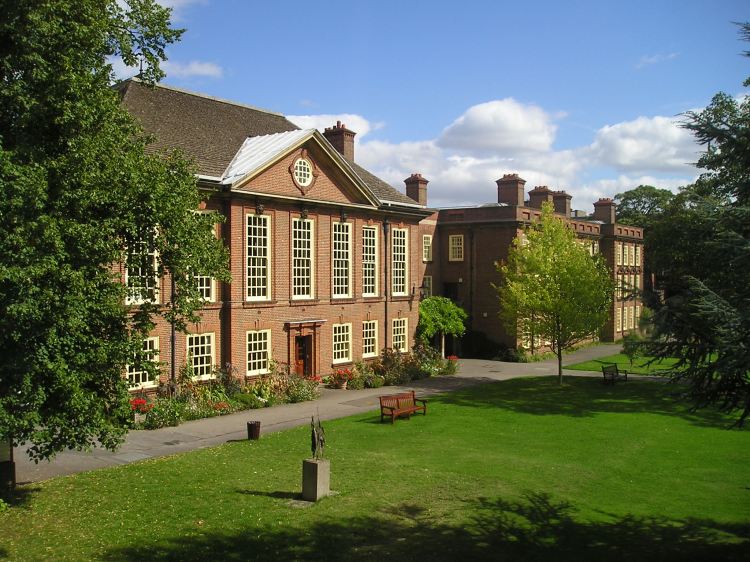
Somerville College Hall (c) Philip Allfrey <https://commons.wikimedia.org/w/index.php?curid=2513138>
As the official ‘Oral History Project Girl’ for the Somerville Archives, I was lucky enough to be invited along to the 2016 gaudy for those who had matriculated before 1964. The Oxford College Gaudy is an alumni reunion held annually for a particular set of matriculation years. A dinner is usually involved, along with a curated selection of events designed by the alumni team. On day number 2, armed with questionnaires and a recorder, I set out to gain an idea of the memories of the women of Somerville who were all at least 70 years old.
I admit, it was quite nerve-wracking, entering a room full of women all of whom were reminiscing and talking with a practiced ease, and all of whom had been among the most educated of their generation. Somerville College, before it went two-sex, held a reputation for being particularly intellectually rigorous, the most academic of all the women’s colleges (and above many of the men’s). In this setting, the fierce intelligence of the women was blatantly framed.
After getting over my original nerves, the day absolutely fascinating. Firstly, I was treated to an excellent talk about the women who worked at Bletchley Park from Tessa Dunlop, author of The Bletchley Girls, accompanied by Mary and Marigold, two Somerville Alumni who had served at Bletchley themselves. All three were interested in debunking the myths that surround Bletchley – and in particular telling the stories of the women who had utterly outnumbered men at Bletchley, despite Hollywood’s portrayal. I then had canapes and lunch with the ladies, and enjoyed a number of interesting conversations ranging from their history to the current Brexit issue.
As the alumni team and I had handed out questionnaires regarding each person’s history – some women were keen to the nature of the survey. One woman pointed out that memory was deeply problematic as a source anyway, to which I argued that capturing how memory affects history is as much a part of oral history as capturing memories. Another was keen to impress upon me the importance of social class in the 1950s, as it was only in this post-war era that the grammar schools allowed those who were not ‘debs’ to enter the higher echelons of education. Two different comments, which nevertheless capture the self-awareness of the women involved in my history-making project. Much oral history surrounds capturing the ‘voice of the voiceless’ – this is not what I am doing. If anything, I am capturing the stories of the ‘voiceless with a voice’: women with the highest, most respectable level of education who nevertheless were often hampered by the expectations and understandings of society.
The women who offered me comments on the survey, and the two ladies I later interviewed, showed a strong awareness of their place in both society and history. The two I interviewed were interested in conveying how they navigated the boundaries set upon them, and how Somerville, with its collection, in the 1950s and 1960s, of fiercely intellectual (but sometimes also having a family) had inspired them throughout the rest of their lives. Both referenced gender without prompting, and in particular offered differing perspectives on the pressures of combining career with family.*
This awareness of gender and of history and of intelligence and experience was apparent throughout the room at the Gaudy. Tessa Dunlop discussed how one woman’s engagement with the Bletchley story at an older age had changed her life from being one of invisibility (‘as an older woman you are invisible in society’) to one of respect. The room heartily agreed with the inescapable invisibility of age. As I noted earlier, the women became noticeable as something other than elderly because of the setting at a Somerville reunion. As an oral historian, it made me wonder that reunions could be an interesting source for collecting memory – for someone a little more practiced than myself. The atmosphere of memory was poignant, and encouraged by all in the room. In a gathering of the ‘least visible’ in society (or at least those who perceived themselves as the least visible), the interest in creating, recording, and preserving memories of when they were more visible, with a huge amount of self-awareness, was incredibly high.
I would like to thank everyone, both organisers and guests, who helped me have such an interesting and enjoyable experience at the Gaudy!
*If this seems a fairly unspecific description, it is because both ladies were (understandably) weary of having their stories on the internet, and I wish to respect those boundaries.

Somerville, from inside the SCR (c) Georgie Salzedo